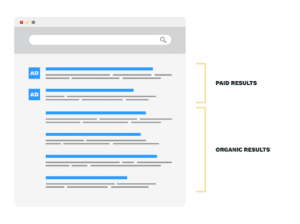What are the Differences Between Paid Search vs Organic Search Results?

This article was first published on February 22, 2017, and was last updated July 2023.
Each day, Google processes over 3.5 billion searches, each with millions of results. When you run a small business, you know that you want your website to show up near the top for searches relevant to your industry. What you may not know is that Google search result pages include two separate sections where you could show up.
What is Search Marketing and Why Do You Need it?
Search marketing, also known as SEM, is a digital marketing strategy that aims to increase a website’s visibility in search engine results through paid advertising and organic optimization techniques. It involves two main approaches: search engine optimization (SEO) and pay-per-click (PPC) advertising.
You need search marketing because it helps you reach your target audience effectively. With SEO, you can improve your website’s organic ranking, which leads to increased visibility, organic traffic, and potential customers. PPC advertising allows you to display targeted ads to users actively searching for specific keywords, ensuring your brand gets immediate visibility.
By combining both strategies, search marketing helps you maximize your online presence, drive traffic to your website, increase brand awareness, and ultimately boost conversion rates and revenue.

Paid Search vs Organic Search
Paid Search Results
Google displays paid results, or pay-per-click (PPC) ads more towards the top. This is the section where you pay every time someone clicks on the ad. Ads cost as little as one cent or as much as several hundred dollars for each click.
The advantage of PPC is immediacy. When you pay for ads, you will automatically show up in a search. If you do not have time to wait for higher rankings, PPC can be a great way to spend your marketing budget. You also can pay to show up for more competitive search terms.
On the flip side, ads usually are more expensive. And once you stop paying for ads, your ad immediately stops showing up in the ads section of Google.
Google changed the format for PPC ads. They removed right-column ads and instead added four paid results to the top of the page and three paid results to the bottom. This change made search results more streamlined and conducive to users scrolling up and down on their phones. (Most people don’t like moving a page from right to left on a mobile device.) The desktop results also changed to create visual consistency across mobile and desktop.
One exception to the “no ads on the right side” rule is Google Shopping. Merchants pay Google to be featured in this special section. When users click on a product, they are directed to a shop Google operates. Similar to PPC (the ads section of Google), you can pay for your products to show up or be listed within Google Shopping. However, your paid ads will show up in the main vertical section either on the top or the bottom. Your AdRank, a combination of your bid price, click-through rates, relevance, and landing page optimization, determines your placement.
Because of the recent changes to Google ads, I do not know the current click-through rates (the rate at which a person who sees an ad clicks on that ad) for the ads section. For any given search term, users historically click on the ads about 5% of the time with the other 95% going to the organic results.
Interestingly, the cost per click on high-volume keywords is less than the cost per click of more specific keywords with stronger buyer intent. For example, the keyword “attorney” has over 60,500 monthly searches and a suggested bid price of $8.77. A keyword like “car accident lawyer Salt Lake City” gets less than 50 monthly searches but has a suggested bid of over $350. The Salt Lake City keyword has a higher chance of converting a visitor into a client, and therefore, business owners will pay more for a search term that converts.
Organic Search Results
Google displays organic search results. In the image above, the organic results are highlighted in blue. You do not have to directly pay Google to show up here. Google tries to provide the best and most relevant websites that fulfill the intent of the search term. However, you will have to invest time and money to rank for certain keywords.
With paid search results, you spend more on specific search terms. Organic search works in the opposite way. It is much harder and more expensive to show up for a general term like “attorney” because all the results are taken up by big-brand companies. However, as we discussed with ads, specific search terms with strong buyer intent will more likely to turn into conversions.
For example, a Salt Lake City lawyer could pay close to $700 if two users click an ad for the search term “car accident lawyer salt lake city.” If the same company showed up organically, each click would be free.
Say you do choose to optimize for organic results instead of pay for PPC ads. The main downside is the time and uncertainty of the results. You could pay thousands of dollars to build up your authority and never appear in the search results. For this reason, you need to hire a respected and prominent SEO company with a proven track record. SEO usually takes between three and six months for you to see results.
If you have some marketing budget set aside for the long-term success of your business, choose SEO. As you build up your website’s authority on Google, you will start to rank for more and more search terms. Even if you stop paying for SEO, you still have the authority and presence on Google.
In the long run, SEO increases incoming organic search traffic and lead generation at a relatively cheap cost. Again, you have to put in the money before you start seeing results and visitors.
Benefits and Disadvantages of Paid and Organic Search
Benefits
Organic Search
- Cost-Effective: Search marketing is a cost-effective strategy that provides a high return on investment (ROI).
- Earns Compounding Results: By consistently implementing search marketing techniques, businesses can achieve compounding results over time, leading to sustained growth and success.
- Boosts Credibility: Organic search boosts credibility by positioning a website higher in the search results, implying to users that the website is trusted and authoritative in its industry.
- Attracts Relevant Users Who are Searching for It: By targeting specific keywords, search marketing ensures that it attracts users who are actively searching for the products or services a business provides.
- Supports Other Marketing Channels: Organic marketing supports and complements other marketing channels, creating a cohesive and comprehensive marketing strategy.
Paid Search
- Gets Instant Results: Paid search delivers instant results, allowing businesses to quickly reach their target audience and generate traffic and conversions.
- Offers Keyword Data for SEO: By utilizing paid search campaigns, businesses gain valuable keyword data that can inform and improve their SEO strategies, leading to better organic search visibility.
- Impressive ROI: Paid search campaigns often provide an impressive return on investment (ROI) as they target users who are actively searching for products or services and are more likely to convert into customers.
- Attracts Ready-to-buy Users: Paid search attracts users who are ready to make a purchase, as they are actively searching for specific products or services, increasing the chances of immediate conversions.
- Provides Actionable Data: Through paid search advertising, businesses receive actionable data and insights regarding user behavior, search trends, and ad performance, enabling them to make informed marketing decisions.
- Supports Other Marketing Channels: Paid search complements and supports other marketing channels by providing additional touchpoints to engage with the target audience and reinforcing brand messaging.
- Accommodates Budgets: Paid search accommodates various budgets, allowing businesses to set specific spending limits and allocate their advertising budget effectively for maximum impact.
Disadvantages
Organic Search
- Needs Routine Upkeep: Organic search requires routine upkeep, as websites need regular updates, content optimization, and monitoring to maintain their rankings and visibility.
- Takes Time: Unlike paid search, organic search takes time to yield results as it relies on the search engine’s algorithms to recognize and rank a website’s content.
- Fights for Real Estate from Search Engines: Organic search requires businesses to compete for limited real estate on search engine results pages (SERPs), making it challenging to achieve and maintain a prominent position among competitors.
- Requires Previous SEO Knowledge: Implementing effective organic search strategies requires previous SEO knowledge and expertise to navigate the complexities of optimizing website structure, content, and technical elements.
Paid Search
- Demands Constant Maintenance: Paid search demands constant maintenance and monitoring to optimize ad performance, adjust bidding strategies, and refine targeting for optimal results.
- Costs Money Upfront: Unlike organic search, paid search requires businesses to invest money upfront for ad placements and clicks, making it a cost-incurring marketing approach.
- Provides Short-term Results: Paid search provides short-term results as long as the ads are active and budget is allocated, but the visibility and traffic cease once the campaign ends.
- Requires Background Skillset: Running effective paid search campaigns requires a specific skillset and understanding of ad platforms, bidding strategies, keyword research, and campaign optimization.
Which Should You Choose?
Both organic and paid results on search engines present advantages and disadvantages. If you’re interested in what both have to offer, develop a strategy to show up in both areas for optimal results.
You could start on the SEO side of things to show up organically, and for approximately six months while you wait to rank, you could pay for ads. This principle works especially well with broad, competitive keywords because they take longer to rank organically and cost less with PPC.
Let’s say the main service you want to rank for is extremely expensive per click. Instead you could spend your money on gaining a presence in organic results.
When you use PPC and SEO together, you can maximize your search presence and keep your marketing strategy as cost-effective as possible. Both take time and money. Monitor your progress, cost, and success with these forms of marketing, and adjust your strategy as needed.
For your clients, it’s important to partner with a white label SEO agency that knows what they’re doing and understands organic and paid search. If you’re looking for a partnership and need help with your client’s SEO strategy, Boostability is here to help! Get started with our Partner Program today!
